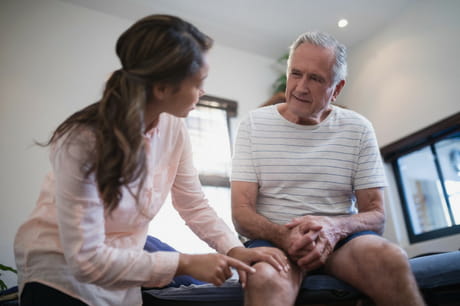Let's get physical: what to expect after joint replacement surgery
,
Get moving with help from your care team
Thanks to technological advances both in and out of the hospital, joint replacement surgeries are more seamless than ever, reducing the average hospital stay to less than four days and halving the nearly 10-inch incision previously required for the procedure. In fact, patients are often on their feet with hospital rehabilitation staff a day after surgery.
With all of this progress, more patients can look forward to life without the pain of failing joints more quickly. But while your care team will encourage you to get moving quickly, you still need to work with them to create a long-term healing plan for a complete recovery.
“Overexertion or improper posture can aggravate your new hip or knee, while staying idle can cause stiffness and muscle fatigue,” said Geisinger orthopaedic surgeon Theodore J. Tomaszewski, M.D. “A mix of at-home exercise and physical therapy will improve strength, while relearning good habits will protect your new joint and maximize range of motion.”
Here are some tips on what to expect in the days, weeks and months following a joint replacement:
Immediately After Surgery
Following the surgery, you’ll be introduced to a physical therapist who will provide tips for getting dressed, bathing and using the restroom.
Rehabilitation begins almost immediately following surgery with simple exercises to jumpstart muscles and get the blood flowing, to eliminate the risk of a blood clot. This will include short walks with a cane or walker, and stretching the new joint to increase range of motion.
1-3 Days Post-Surgery
After a few days’ recovery, your care team will lay out a list of specific goals before release, including the ability to get in and out of bed without assistance, to walk up and down several steps and to perform exercises with the help of a cane or walker.
Upon completion, your doctor will decide if you should be released to an inpatient rehabilitation center or to an outpatient physical therapy program based on your age, health and how your surgery went. Any need for pain management will also affect this decision.
Though a handful of exercises will be provided by therapists in the hospital, the bulk of rehabilitation will take place at one of these facilities, which often resembles a gym or health club.
“Rehabilitation starts small with stretching to increase range of motion, but patients should also aim to walk for 20-30 minutes at least twice per day,” said Dr. Tomaszewski.
6-10 Weeks Post-Surgery
Throughout rehabilitation, physical therapists will track progress using common gym equipment like treadmills and weights, coupled with stretching and body-weight exercises tailored to your individual progress.
With outpatient programs, therapists will also send you home with exercises to do on your own. Think of these as homework!
“Regular treatment sessions should continue for at least six weeks, but preferably much longer, with at-home exercises becoming more advanced as recovery continues,” said Dr. Tomaszewski.
2-3 Months Post-Surgery
Three months after your joint replacement surgery and thorough rehabilitation, you should be able to enjoy recreational activities like dancing, swimming or riding a bicycle without pain.
However, you should still avoid high-impact activities and exercises that may injure tissue surrounding the joint.
6-12 Months Post-Surgery
The average patient recovers from a joint replacement and lives without pain 6-12 months after surgery. By month six, you should still be following your physical therapists’ treatment plan, but also be able to perform all tasks associated with a healthy lifestyle.
“Though hospital and rehab stays are getting shorter, it’s still important that patients recognize surgical joint replacement as a long road, with full recovery taking months of dedicated work,” said Dr. Tomaszewski.
Dr. Theodore J. Tomaszewski is a board-certified general orthopaedic surgeon with a subspecialty interest in joint replacement. He sees patients at Geisinger Orthopaedics and Sports Medicine in Scranton. To schedule an appointment, please call 800-275-6401.
With all of this progress, more patients can look forward to life without the pain of failing joints more quickly. But while your care team will encourage you to get moving quickly, you still need to work with them to create a long-term healing plan for a complete recovery.
“Overexertion or improper posture can aggravate your new hip or knee, while staying idle can cause stiffness and muscle fatigue,” said Geisinger orthopaedic surgeon Theodore J. Tomaszewski, M.D. “A mix of at-home exercise and physical therapy will improve strength, while relearning good habits will protect your new joint and maximize range of motion.”
Here are some tips on what to expect in the days, weeks and months following a joint replacement:
Immediately After Surgery
Following the surgery, you’ll be introduced to a physical therapist who will provide tips for getting dressed, bathing and using the restroom.
Rehabilitation begins almost immediately following surgery with simple exercises to jumpstart muscles and get the blood flowing, to eliminate the risk of a blood clot. This will include short walks with a cane or walker, and stretching the new joint to increase range of motion.
1-3 Days Post-Surgery
After a few days’ recovery, your care team will lay out a list of specific goals before release, including the ability to get in and out of bed without assistance, to walk up and down several steps and to perform exercises with the help of a cane or walker.
Upon completion, your doctor will decide if you should be released to an inpatient rehabilitation center or to an outpatient physical therapy program based on your age, health and how your surgery went. Any need for pain management will also affect this decision.
Though a handful of exercises will be provided by therapists in the hospital, the bulk of rehabilitation will take place at one of these facilities, which often resembles a gym or health club.
“Rehabilitation starts small with stretching to increase range of motion, but patients should also aim to walk for 20-30 minutes at least twice per day,” said Dr. Tomaszewski.
6-10 Weeks Post-Surgery
Throughout rehabilitation, physical therapists will track progress using common gym equipment like treadmills and weights, coupled with stretching and body-weight exercises tailored to your individual progress.
With outpatient programs, therapists will also send you home with exercises to do on your own. Think of these as homework!
“Regular treatment sessions should continue for at least six weeks, but preferably much longer, with at-home exercises becoming more advanced as recovery continues,” said Dr. Tomaszewski.
2-3 Months Post-Surgery
Three months after your joint replacement surgery and thorough rehabilitation, you should be able to enjoy recreational activities like dancing, swimming or riding a bicycle without pain.
However, you should still avoid high-impact activities and exercises that may injure tissue surrounding the joint.
6-12 Months Post-Surgery
The average patient recovers from a joint replacement and lives without pain 6-12 months after surgery. By month six, you should still be following your physical therapists’ treatment plan, but also be able to perform all tasks associated with a healthy lifestyle.
“Though hospital and rehab stays are getting shorter, it’s still important that patients recognize surgical joint replacement as a long road, with full recovery taking months of dedicated work,” said Dr. Tomaszewski.
Dr. Theodore J. Tomaszewski is a board-certified general orthopaedic surgeon with a subspecialty interest in joint replacement. He sees patients at Geisinger Orthopaedics and Sports Medicine in Scranton. To schedule an appointment, please call 800-275-6401.

Content from General Links with modal content




